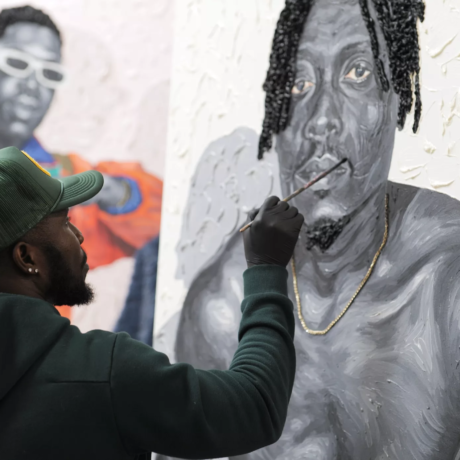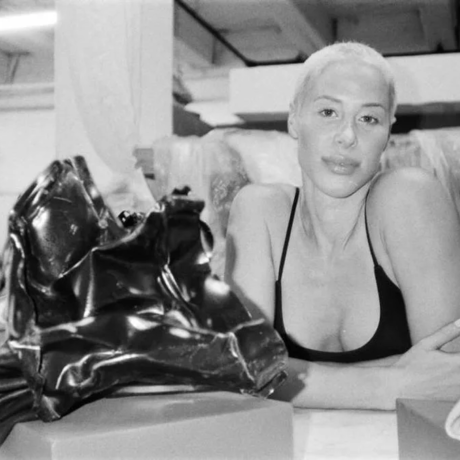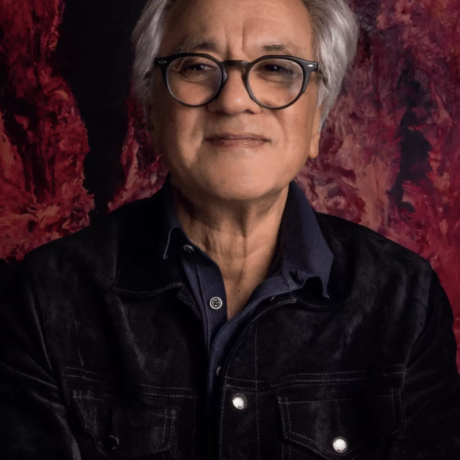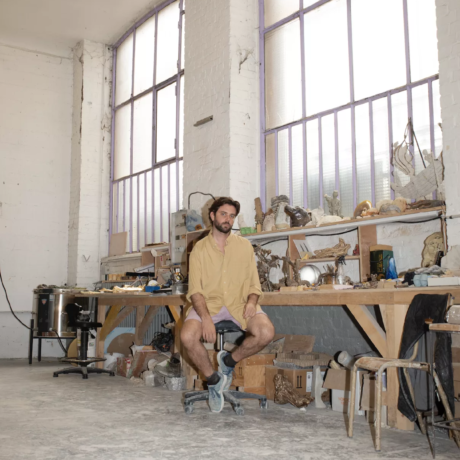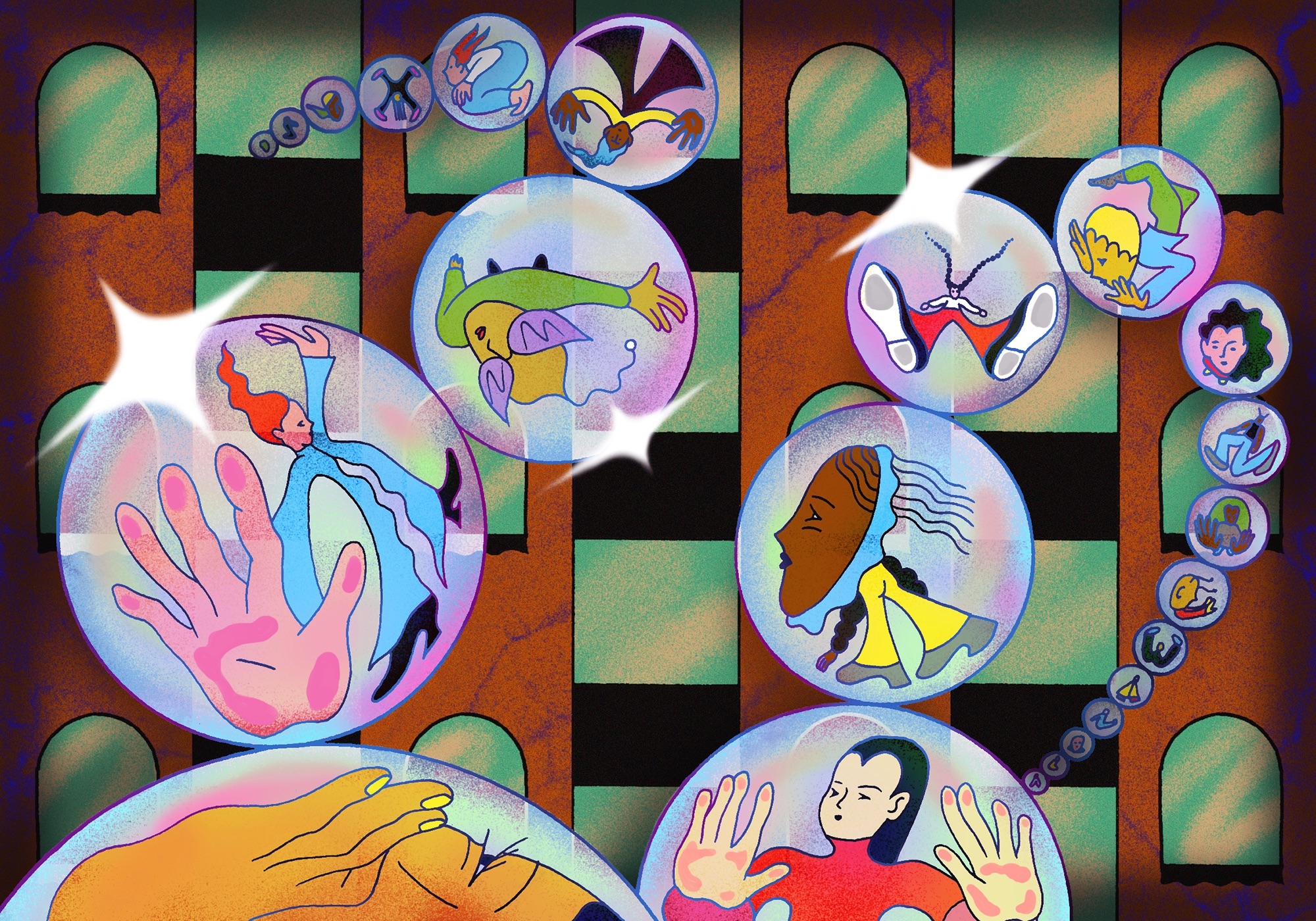
I grew up in a working-class family in Bradford On Avon, Wiltshire, living with my mum and sister. My parents had me when they were just in their twenties, and had separated before my first birthday.
Growing up in a single-parent household, there wasn’t much disposable income. My mum is a teaching assistant but would also work as a hairdresser and make-up artist on the weekends and my dad (a carpenter and plumber by trade) would work overtime to make ends meet. Nonetheless, I’ve watched both my parents progress in their careers over the years and continue to embark on further education and build their own skills, and that’s inspired me to pursue my own ambitions. Both parents have actively encouraged me with my artistic endeavours: I was constantly making, drawing, and listening to music.
When looking at universities I travelled to London to attend open days, but the options were overwhelming and I struggled to decide on what university to attend. My family couldn’t offer guidance as they were not informed of the art scene or London in general—both living only minutes from where they had grown up. Coming from a rural town the success stories and the illusion of instant immersion in the arts scene influenced my decision to accept an offer from Central Saint Martins.
I was the first family member to move away from our home area, live in a city, and study full time at university, so there was a lot of anxiety about what university life would be like and if it were worth the cloud of debt that would inevitably follow. Coming from a low-income background, pursuing a fine-art degree, without guaranteed job prospects post-graduation, meant stress for my family.
During my art foundation course at Trowbridge College, all resources were free, so we could work and experiment with anything. At CSM, the harsh reality of self-funding artistic practices and the pressure for workers to succeed (as otherwise, it can feel like a waste of materials, money, and time) was stifling. Typically working in series is the only way for me to compare and engage with my work as it allows me to analyse outcome and technique. This meant that bursaries were fundamental as otherwise I would not be able to afford the materials needed.
“At CSM, the harsh reality of self-funding artistic practices and the pressure to succeed was stifling”
I had anticipated friendly, close-knit student subcultures. However, a large percentage of the student body and tutors/lecturers were the opposite of this, leaving me feeling very lonely at the beginning of my first year. I found myself at an economic and cultural disadvantage to many fellow students, with people from more stable financial backgrounds having not only better economic capital, but also stronger social and cultural capital. My peers had a better experience and knowledge of the arts and of the university system with financial stability to fall back. I found the initial experience overwhelming: I didn’t know how to bond and communicate with students from very different financial backgrounds. However, I am very lucky to have eventually formed strong friendships.
A lot of the arts relies on contacts or personal connections to enable opportunities or be accepted, rendering them inaccessible to people with no background experience. Volunteering in the creative industries has never really been a viable option for me as work has always been necessary for the purpose of earning money to live on. I am constantly looking and pushing for opportunities but they arrive sporadically and can take more time than I anticipated.
Socially, I’ve found it hard to bridge the divide between myself and my fellow students as I can get resentful of how much ‘easier’ other people’s lives have been, and how much they are able to take for granted. You want to feel like you can talk about how embedded the strain of being working class in an upper-class university is, but it can become exhausting when others are from completely different worlds. I am extremely lucky to be surrounded by friends who support and motivate me. We talk about our different experiences and by doing so gain a broader understanding of both sides of the issue.
Although I receive as much financial support as possible from my family (especially my father’s side) I struggled to find an eligible guarantor for my flat in London. To guarantee the rent you had to be earning higher than the average pay for citizens in the UK. As my mum’s full-time income was half of what was stated as a secure income to be an eligible guarantor, this resulted in awkward, uncomfortable conversations which often made my parents/family feel inadequate.
“Bursaries were fundamental for me as otherwise I would not be able to afford materials”
The scale of what we would lose if the flat were to catch fire, for example, was immense and would affect every corner of my family, taking away multiple homes that they have worked their whole lives for. My flatmates’ parents could say yes without batting an eye. This was a harsh reminder and forced acknowledgment of the divide within my circle of friends and how much further into debt being working class drives you. I am paying for this experience through maintenance loans and multiple grants, alongside the huge pressure of being aware that if anything goes wrong up to four family members’ homes are at stake.
I am living off a myriad of income streams. My rent and bills consume my Maintenance Student Loan, approximately £870 a month. Regular amounts of maintenance money from my dad and stepmum and termly gifted amounts from my grandparents pay for my food and travel costs. A Wiltshire Community Foundation Bursary given through my art foundation college is being saved to cover the rent costs of the months I will be living in the city out of term time which are not covered by the student loan, as the tenancy runs over the entire year rather than an academic calendar. A University of the Arts London Bursary pays for materials and the UAL Hardship fund goes towards gallery visits, memberships and books.
The university supplies me with £1,000 halfway through each academic year that is accessible for anyone with full state funding support and I received a Hardship Fund sum at the start of the academic year. Both provide me with enough money for day-to-day expenses and supplies/materials. When galleries open again, funding money allows me to attend exhibitions.
Those who don’t have the time, motivation, or healthy mindset to commit to the application processes miss out on the different funding streams. The extra time and effort lower-income students must spend to navigate a route through eligibility criteria, application processes and gathering relevant evidence to demonstrate parental income can seem daunting. However they are vital for quality of life and to ensure the same opportunities as peers.
“People from more stable financial backgrounds have not only better economic capital, but also stronger social and cultural capital”
During my art foundation year, we had a couple of trips up to galleries in London. These were extremely beneficial as they burst the bubble of cities being a distant place, different from where I lived. If there were more opportunities for students at a cultural disadvantage to visit art institutions and meet people who make a living out of creating, it could help dismantle the stigmas associated with pursuing a creative education over an academic one. Challenging the stereotypes and assumed roles of a creative job could allow the art scene to become more accessible for a wider variety of people.
Having to fund materials at CSM independently has felt immense and limiting. If the university could fund free access to materials for everyone, this could reduce the way that lower-income students feel inferior to their peers and create an interesting leveller in terms of creative ability. I could never sustain expensive working materials (such as oil paints and linen) so I have to resort to found objects and cheap, accessible mediums. As much as this has now become important for my practice, when beginning university students should have equal access to media with no specialisation influenced by cost and availability.
My family’s experiences of employment and the absolute need for a structured job with dependable income always makes me question how reliable an artist’s income is. So far, my impression is that there are very few artists who can sustain themselves without inherited wealth or dual income, further emphasising my uncertainty about my future within the arts.
Despite it all, I do feel excited. I hope to work within the arts, as creativity and exploration are an integral part of what I do. I have the need for full-time employment after university to fund day-to-day living, but I feel no obligation to do so in London or at home when my options of where to live and work are endless. I would like to introduce others to the potential of the arts as a tool to navigate and explore self-expression and resilience using their own creativity.
